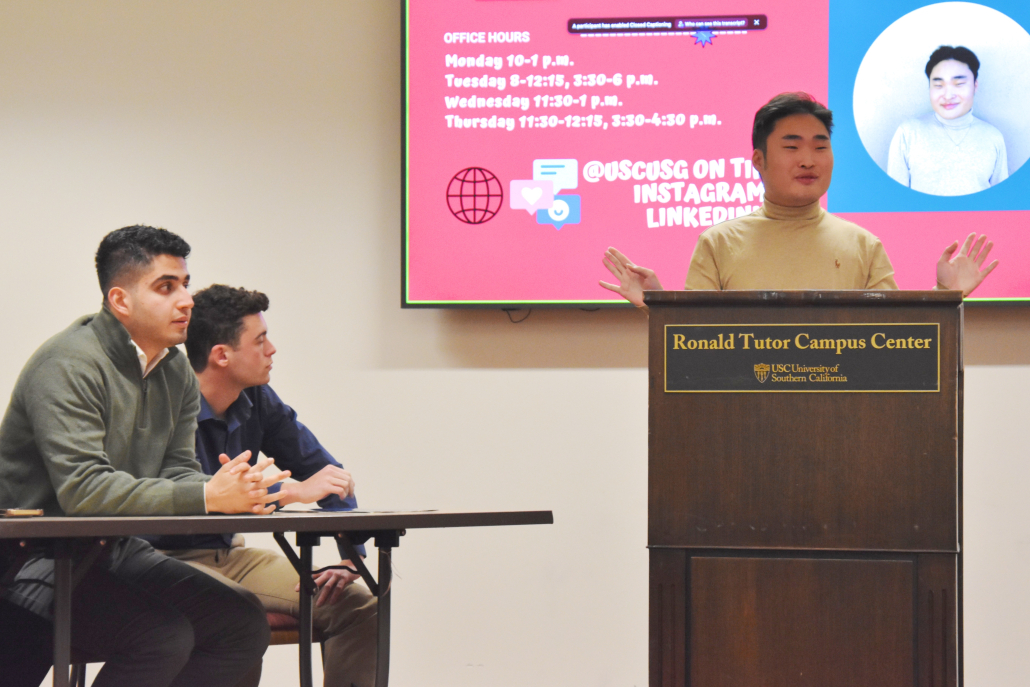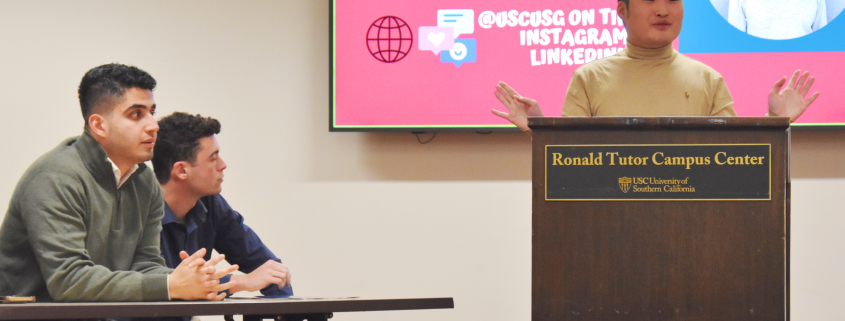USG to implement runoff vote if one-third majority not met

The tabled discussion from last week’s Senate meeting to implement a run-off voting system for this upcoming election period and a rank-based voting system for future elections resumed at Tuesday night’s Senate meeting.
This year there are five presidential candidates, so the discussion was raised that even if a candidate were to win 20.01% of the vote, the majority of the student body would have a president that they did not vote for.
“I’m concerned because under the current bylaws [the elections] have the potential to be conducted unfairly,” said chief of staff Diego Andrades. “We’ve never been in a situation where the laws of the current electoral system are visible and significant. However, it’s the responsibility of this senatorial body to remedy this flaw.”
The Senate discussed and voted to amend the election bylaws that in the event that no candidate receives more than a one-third majority of the total votes excluding abstentions, a run-off election will be held. Senators could only vote if they were not actively campaigning in the election. Of the eligible senators, the amendment was passed 6-0.
“I think that this election is about the voters, not the candidates,” said senator Sanjana Sambhwani. “We’re not trying to be on some power high and manipulate the student government or the student body. We’re doing this so that our voters’ votes matter … I think that the run-off will give more power to voters.”
With the upcoming election so close, many of the candidates expressed concern over changes to the elections code so near to the voting period and possibly giving more room for the elections committee to make changes in the future.
“We don’t just make up these rules on the spot,” senator Yoav Gillath said. “That’s kind of what being an electoral system is all about and being a democracy. It’s having rules and sticking to those rules regardless of who runs.”
The Senate agreed to table the motion to establish a ranked-choice voting system for future elections after the current elections period is over. Under this system, voters can rank their choices for a candidate rather than simply picking one candidate.
“My thoughts were with the tabling is to let the election stuff cool down before we make the decision for future elections,” senator Maria Barun said.
Vice President Nivea Krishnan presented updates in regards to the Fryft program, providing a timeline of the changes. Prior to 2017, the University used Campus Cruisers, a student-run shared ride service and then started its partnership with Lyft in 2017 which started with the shared ride model.
In compliance with the Los Angeles County policy due to the coronavirus outbreak, Lyft removed the option for shared rides and students were able to utilize the single-rider Fryft program. The University recently switched back to its original shared-ride model.
The University found that the single-ride model was a financially unsustainable model for the school, thus switching to the shared-ride model.
“I know there’s been a lot of frustration around wait times,” Krishnan said. “I’m personally frustrated with wait times, too. The best response we could get was that drivers across the country are still getting used to this system as, for three years, there was no shared ride option on Lyft.”
USG is hoping to address the concern about safety and is currently collecting student feedback about it.
“We want to point out that the stigma a lot of students have that riding with community members is what makes things unsafe should be reevaluated,” Krishnan said. “Put into perspective that we are students that came into a community that has already existed for hundreds of years, and just because you are riding with a non-USC student doesn’t mean you’re necessarily any less safe.”
Barun gave updates on USC ID card integration, a project she is working on to allow students to use their ID card on their mobile devices. This project is projected to cost $2.5 million as the hardware needs to be updated in all places on campus for students to be able to use both physical and digital ID cards.
USG swore in senator William Lee, a senior majoring in history and political science, who replaced former senator Sam Nadol who resigned due to studying abroad.
USG communications department appoints Joanne Lee, a sophomore majoring in cognitive science, as the assistant director of creative services.
The Senate unanimously voted to cancel the Senate meeting on Feb. 14 in the case that a presidential debate is held.

